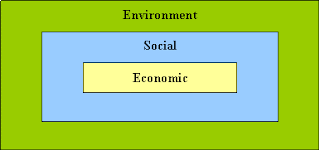The most famous and common used definition of sustainability was stated by Brundtland Commission in 1987, which cited that:
"Sustainable development is development that meets the needs of the present without compromising the ability of future generations to meet their own needs."
In other words, sustainability is about ensuring what we do today to provide for ourselves and our needs, does not result in damaging the ability of future generations to provide for themselves.
Many misconceptions saying that sustainability is only environment related. It is only green stuffs and for tree huggers. Actually, the term sustainability covers a very wide scope. There are three main aspects of sustainability, which some people called the three bottom lines:
- Environment: focus to the preservation of our earth, nature, surrounding environment, which will support all living beings.
- Social: focus to the wellbeing of humankind.
- Economic: focus on the economic and profitable gains.

The figure above portrays these three aspects of sustainability and their relative importance. Environment encompasses social and economic because without environment, there is no place for men to live and economic will not be able to strive. Social is the second because without people, there is no economic. The last is economic because in the end profitable ventures are essential to support our wellbeing and way of life.


No comments:
Post a Comment